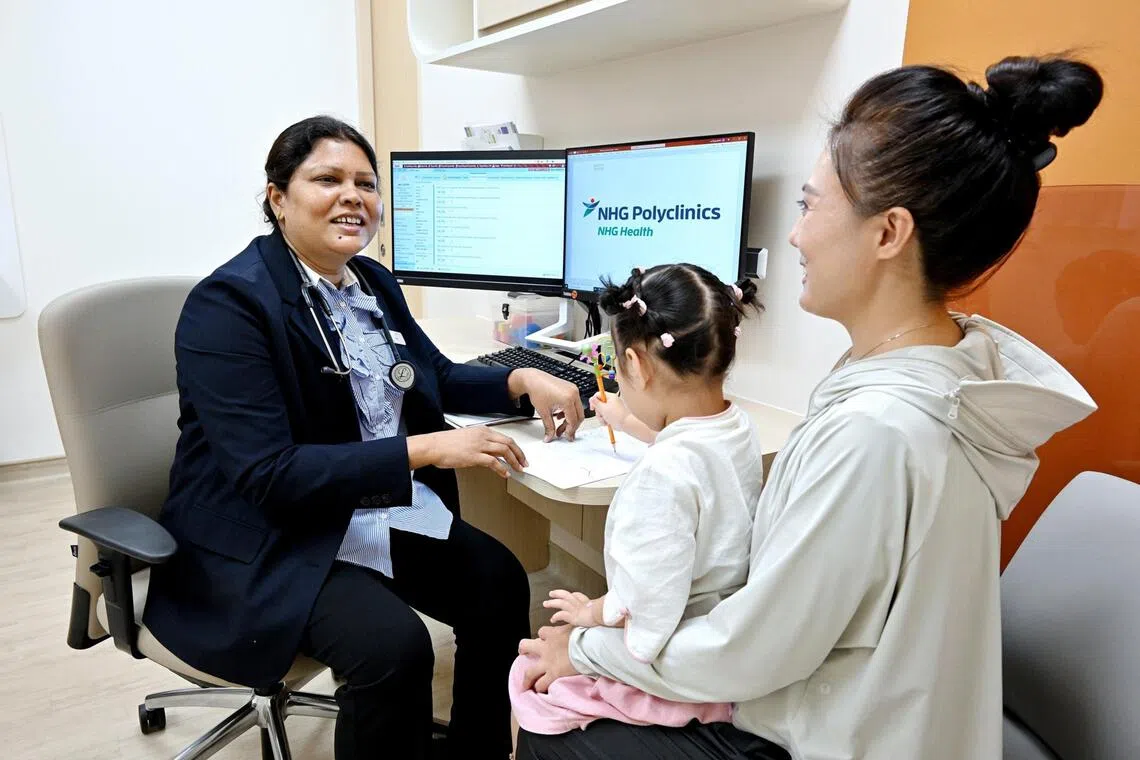Singapore to recognise family doctors as specialists
Sign up now: Get ST's newsletters delivered to your inbox

The Specialists Accreditation Board will formally recognise family medicine as a speciality from Nov 1.
PHOTO: ONG YE KUNG/FACEBOOK
SINGAPORE – Come 2026, Singapore may see some 200 family physicians accredited as specialists, an indication that they are well trained and equipped with specialised skill sets to care for Singapore’s ageing population in the community, including patients with complex care needs.
The Specialists Accreditation Board (SAB) will formally recognise family medicine as Singapore’s 36th speciality from Nov 1, with eligible family physicians invited to apply for accreditation.
This is an important policy move, Health Minister Ong Ye Kung said in an Oct 31 Facebook post.
He said family doctors, who are “trusted advisers who help us manage our health and stay healthy”, are essential to the shift of the healthcare system’s centre of gravity away from hospitals to the community, from tertiary and secondary to primary care, and from curative treatment to management and prevention.
The College of Family Physicians Singapore (CFPS) has advocated for this recognition for many years, its president, Dr Wong Tien Hua, told The Straits Times, adding that this is a “milestone achievement” for Singapore.
“This recognition uplifts the entire primary care fraternity as it enhances the professional identity of family physicians, creates clear pathways for advanced training, and reinforces the pivotal role of family medicine in achieving better population health outcomes for all Singaporeans,” he said.
Countries that already recognise family medicine as a speciality include the US, Japan and Indonesia.
The Ministry of Health (MOH) on Oct 31 said more than 200 registered family physicians who have attained the Fellowship of College of Family Physicians (Singapore) will be invited to be the first batch to apply for specialist accreditation.
The fellowship is awarded to those who have successfully completed the 24-month training programme conducted by CFPS, which includes at least 24 hours of clinical practice each week, original research and clinical teaching.
Applicants must be currently registered family physicians with valid practising certificates. In addition, they must have completed 240 hours of clinical practice locally in the past year, which averages out to about 20 hours per month. This can include up to 120 hours spent on the clinical teaching of family medicine trainees.
Those conferred with the fellowship on and before Nov 30 have 12 months to submit their specialist accreditation applications to the SAB. Those conferred after Nov 30 have six months to do so.
CFPS’ Dr Wong said that the first cohort will form the foundation of a recognised body of family medicine specialists trained and equipped to lead primary care transformation under Healthier SG
The batch of fellows eligible for accreditation are already practising as de facto specialists, and can provide multidisciplinary care to patients, especially those with complex needs and multiple comorbidities, he said.
“Hence, the recognition does not mean the care that patients receive would change dramatically, or that the consultation charges will rise. Rather, it serves as a formal acknowledgement of excellence for those who have the knowledge and skills to practise at this level,” said Dr Wong.
He added that the public can also be assured that these primary care doctors have the necessary training to deal with the complexity and challenges of Singapore’s ageing population.
In addition, a new advanced family medicine programme is being developed, and is expected to start taking in trainees from 2028.
The programme, which will replace the fellowship after the conferment of the last batch of fellows in 2030, will set the standards for specialist accreditation in family medicine and for future entry into the Register of Specialists.
Dr Muhamad Zulhakim Aman, 36, a family physician at the Woodlands Polyclinic under NHG Health, is training for the fellowship. He is encouraged by the prospect of being formally recognised for his day-to-day work, which includes caring for patients with multi-morbidity, poly-pharmacy and mental health needs layered with complex psychosocial backgrounds.
On the accreditation requirements of 240 hours of clinical practice, Dr Zulhakim believes it is a fair and attainable benchmark which reflects real-world practice patterns of most family physicians.
The allowance for teaching hours also recognises the dual clinical-educator roles that many family physicians take on, said Dr Zulhakim.
With the recognition of family medicine as a speciality, MOH hopes that medical students will seriously consider all three main medical career tracks in the public healthcare sector – specialists, family physicians and hospital clinicians who are trained in broad-based competencies


